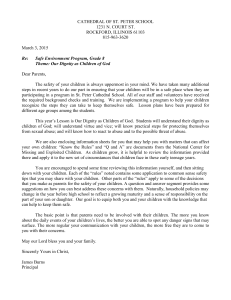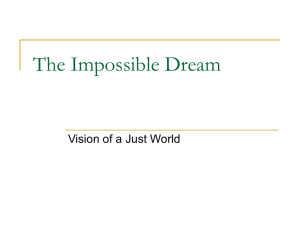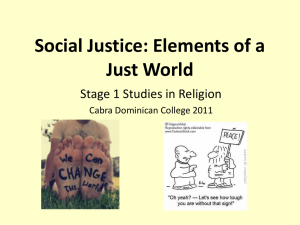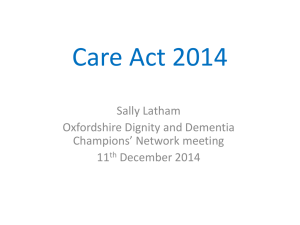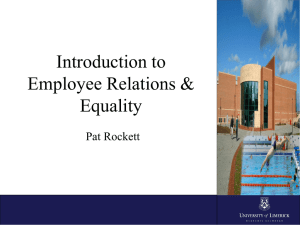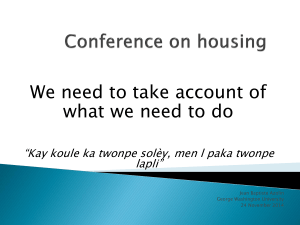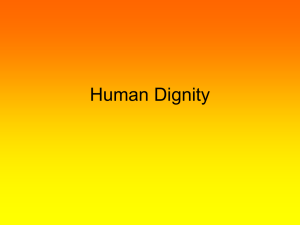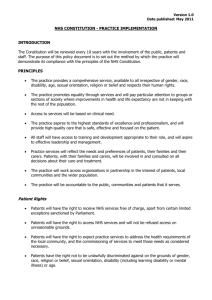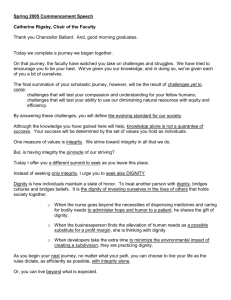The significance of the constitutional values of human
advertisement
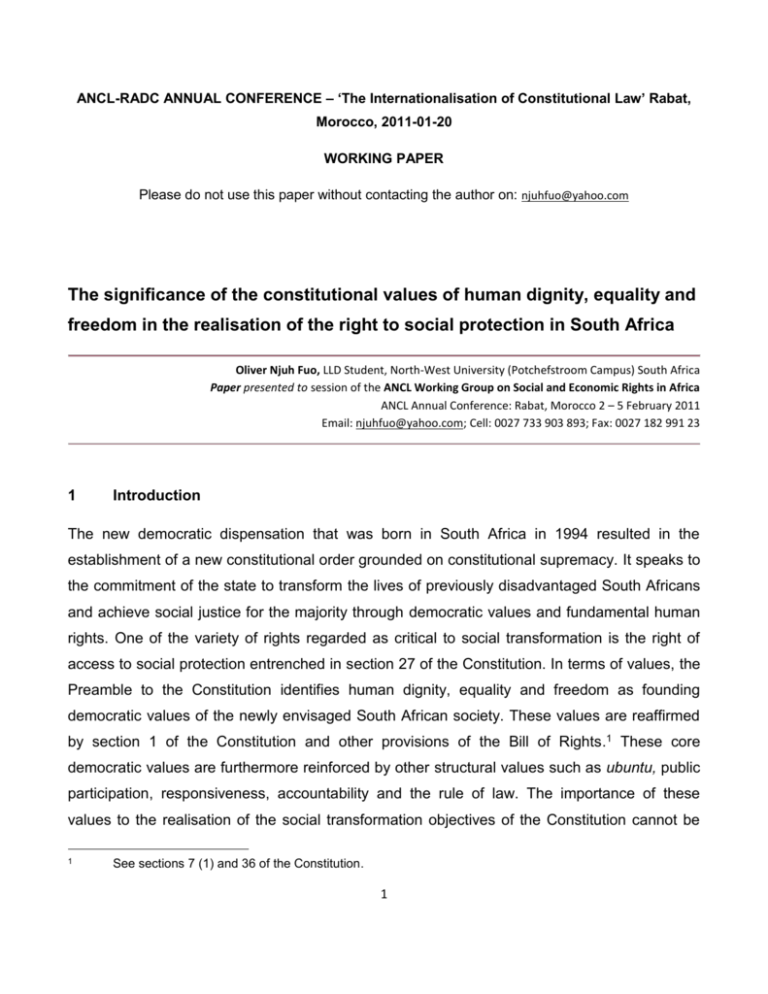
ANCL-RADC ANNUAL CONFERENCE – ‘The Internationalisation of Constitutional Law’ Rabat, Morocco, 2011-01-20 WORKING PAPER Please do not use this paper without contacting the author on: njuhfuo@yahoo.com The significance of the constitutional values of human dignity, equality and freedom in the realisation of the right to social protection in South Africa Oliver Njuh Fuo, LLD Student, North-West University (Potchefstroom Campus) South Africa Paper presented to session of the ANCL Working Group on Social and Economic Rights in Africa ANCL Annual Conference: Rabat, Morocco 2 – 5 February 2011 Email: njuhfuo@yahoo.com; Cell: 0027 733 903 893; Fax: 0027 182 991 23 1 Introduction The new democratic dispensation that was born in South Africa in 1994 resulted in the establishment of a new constitutional order grounded on constitutional supremacy. It speaks to the commitment of the state to transform the lives of previously disadvantaged South Africans and achieve social justice for the majority through democratic values and fundamental human rights. One of the variety of rights regarded as critical to social transformation is the right of access to social protection entrenched in section 27 of the Constitution. In terms of values, the Preamble to the Constitution identifies human dignity, equality and freedom as founding democratic values of the newly envisaged South African society. These values are reaffirmed by section 1 of the Constitution and other provisions of the Bill of Rights.1 These core democratic values are furthermore reinforced by other structural values such as ubuntu, public participation, responsiveness, accountability and the rule of law. The importance of these values to the realisation of the social transformation objectives of the Constitution cannot be 1 See sections 7 (1) and 36 of the Constitution. 1 underestimated. In fact, section 39(1)(a) of the Constitution dictates that when interpreting the variety of rights entrenched in the Bill of Rights, all courts “must promote the values that underlie an open and democratic society based on human dignity, equality and freedom. In addition, these values are expected to steer the conduct of future government. The purpose of this paper is to assess the extent to which the courts have thus far interpreted and applied the core values of human dignity, equality and freedom in enforcing the section 27(1)(c) right of access to social protection. Furthermore, the paper estimates the significance of these values in guiding executive/administrative action aimed at realising the right to social protection. To realise the above objectives, this paper provides a brief socio-economic background that informed the transformative vision of the Constitution; presents a conceptual and constitutional framework to the right to social protection; reviews the basic meaning assigned to the core values of human dignity, equality and freedom; analyses the application of the core values in social protection cases; and discusses the significance of these values in realising the right to social protection in South Africa. It is argued that these values have been central considerations in most of the social protection cases that have come before the Constitutional Court. 2 Socio-economic context The inferior living conditions imposed on the majority of South Africans by the obnoxious system of apartheid had severe socio-economic consequences on their lives. It robbed the majority of their human dignity and deprived them of basic human rights.2 It laid the bedrock for gross social inequalities, social dislocations and destitution experienced by the majority in South Africa.3 As the negotiations for constitutional democracy intensified, former president, Nelson Mandela expressed the views of the ANC as follows: A simple vote, without food, shelter and health care is to use first generation rights as a smokescreen to obscure the deep underlying forces which dehumanize people. It is to create an appearance of equality and justice, while by implication socioeconomic inequality is entrenched. We do not want freedom without 2 Fedsure Life Assurance v Greater Johannesburg Transitional Metropolitan Council and Others [1998] ZACC 17, para 28-30. Hereafter referred to as Fedsure Life Assurance. 3 Louw PE, The Rise, Fall and Legacy of Apartheid (2004) (Library of Congress Cataloguing-in-Publication Data, USA; Klug H, Constituting Democracy: Law, Globalism and South Africa’s Political Reconstruction (2000) Cambridge University Press, 85; O’Regan J in The Mazibuko Case, para 59. 2 bread, nor do we want bread without freedom. We must provide for all the fundamental rights and freedoms associated with a democratic society4 The above views strengthened the foundation for general societal transformation. The Preamble to the Constitution and the variety of justiciable socio-economic rights entrenched in the Bill of Rights are hallmarks of the aspirations of the new constitutional objectives to restore lost dignity, attain social transformation and improve the lives of all through inter alia the redistribution of resources.5 Arguably, the constitutional mechanism adopted for the redistribution of the country’s resources is the entrenchment of a variety of justiciable socioeconomic rights in the Bill of Rights. One (amongst the variety) of socio-economic rights recognised as critical to the redistribution of resources and the attainment of social transformation is the right to social security.6 The Constitution imposes positive and negative obligations on government to realise the variety of rights entrenched in the Bill of Rights. 7 In order to ensure that the transformative objectives of the Constitution are not easily derailed, the Constitution entrenches the core values of human dignity, equality and freedom, to guide government efforts directed towards realizing the variety of guaranteed rights. The Constitution also mandates that these values must guide the courts in determining government’s compliance with its constitutional obligations.8 3 Social protection: constitutional and conceptual framework Mandela NR ‘Address on the occasion of the ANC’s Bill of Rights Conference’ in a Bill of Rights for a Democratic South Africa: Papers and Report of a Conference Convened by the ANC’s Constitutional Committee, May 1991 (Centre for Development Studies, UWC). See also Sachs A J, “Lead in address” in ‘Socio-economic Rights in the South African Constitution: Can we ensure inclusion’ Goedgedacht Forum for Social Reflection, held on 25 August 2001, 4-5. 4 Mokgoro Y “Preface” in Andrews P and Ellmann S (ed) Post Apartheid Constitutions: Perspectives on South Africa’s Basic Law. In Ferreira v Levin NO and Others; Vryenhoek and Others v Powel NO and Others 1996 (1) BCLR 1 (hereafter referred to as the Ferreira Case), at para 180, Chaskalson P noted that in a welfare state, regulation and redistribution is accepted as good for the public interests. 6 Scheinin, “The Right to Social Security” in Eide et al (eds) Economic, Social and Cultural Rights 1995 159; Goldblatt and Liebenberg 2004 SAHRJ 157; Scheinin 1995 “The Right to Social Security” 160; Chenwi 2008 ESR Review 23; See sections 27(1)(c), 27(2) and 7(2)) of the Constitution read jointly (Liebenberg 2001 “The Protection of Economic and Social Rights in Domestic Legal Systems” 55-84; Brand “Introduction to socioeconomic rights in the South African Constitution” in Brand and Heyns (eds) Socio-Economic Rights in South Africa 2005 6. The concept of social security will be analysed below. 7 See for example sections 7(2), 26(2) and 27(2) of the Constitution; Brand “Introduction to socio-economic rights” 2005 9-12; Du Plessis Fulfilment of South Africa’s Constitutional Environmental Right (2008) 98-100. 8 Section 39(1) of the Constitution. 5 3 In South Africa, section 27(1)(c) of the Constitution guarantees everyone the right to have access to social security, including appropriate social assistance if they are unable to support themselves and their dependants. Although the right to social security is protected in international, regional and domestic laws, a clear universally accepted definition of the concept of social security remains elusive.9 Generally, social security consists of various strands that are partly distinguished by their method of financing. The major strands include social insurance (employer-employee contributory schemes) and social assistance (means tested state benefits).10 However, the traditional and restrictive conceptualisation of social security has been criticised by many scholars.11 They argue inter alia that, it fails to meet the basic needs of poor people in developing countries like South Africa such as shelter, nutrition, safe water for domestic purposes and basic sanitation. The implication of the above is that, a large portion of the South Africa’s poor remains excluded from the traditional social security system. To extend coverage to a large group of vulnerable people, a comprehensive system of social protection was proposed by the Taylor Commission in 2002.12 Social protection denotes a system not linked to employment relationships and is designed to cater for basic social needs. It is founded on the conviction that society as a whole is responsible for its weaker members.13 The Taylor Commission defined “comprehensive social protection” in the South African context as broader than the concept of social security because it incorporates developmental strategies and programmes designed to ensure collectively, a minimum acceptable standard of living for all. It embraces and goes beyond the traditional measures of social insurance, social assistance and social services to include many developmental initiatives and programmes undertaken by the state to improve the quality of life of all.14 The nationally prescribed indigent policies of local government that provide free basic social services such as water, sanitation 9 Olivier et al Social Security: A Legal Analysis 23-24.. Van der Berg 1997 Development Southern Africa 484; Horsten, Jansen van Rensburg, Olivier and Mpedi, “Socio-Economic Rights” in Introduction to Human Rights Law 2009 172-174. For more strands, see Olivier et al Social Security: A Legal Analysis 23-24, Chapters 2, 18 and 19. 11 Horsten, Van Rensburg, Olivier and Mpedi, “Socio-Economic Rights” in Govindjee and Vrancken (eds) 2009 173; Jansen van Rensburg “A Human Rights Based Approach to Poverty” 2007 167-168; Transforming the Present-Protecting the Future 2002 35-43. 12 Transforming the Present-Protecting the Future 2002 61. 13 Olivier et al Social Security: A Legal Analysis 26. 14 Transforming the Present-Protecting the Future 40-41 ; Horsten, Jansen van Rensburg, Olivier and Mpedi, “Socio-economic rights” in Govindjee and Vrancken (eds) 2009 173-174 10 4 and electricity to the poor should, for example, be viewed in this context.15 Social services in this context is defined as a set of “developmental, preventative and remedial” services provided by the state to persons without adequate resources to enable them to afford the basic necessities required for a dignified life.16 It emerges that social security, social assistance, social insurance and social services are elements of South Africa’s social protection system and are all seen “as different means of promoting the ultimate goal” of alleviating poverty and deprivation.17 Social protection in this context gives effect to other socio-economic rights such as the right of access basic health care services and water (section 27(1)(a) and (b) of the Constitution). Therefore, social protection will be used in this paper to cover elements that do not fall under the traditional, restrictive conceptualisation of social security. The Constitutional Court has in detail analysed the ambit of the right of access to social protection contained in section 27(1)(c) of the Constitution.18 The Court and constitutional lawyers have interpreted the right of “access to” social protection enshrined in section 27(1)(c) of the Constitution to be broader than “the right to” social protection as the former transcends just social protection programmes/provisions to include other imperatives such as financing of some of these programmes and other appropriate services. A right of access to social protection further suggests that it is not only the state that is responsible for the provision of social protection but that other agents within society, including individuals themselves, must be enabled by legislative and other measures to provide their own social protection. The state, however, must create the conditions for access to social protection for people of all economic levels in society.19 The Court reiterated that, given that the socio-economic rights in the Bill of Rights are interrelated and interdependent, the fulfilment of one of the socio-economic rights is 15 See for example, the Preamble, sections 2, 3 and 11 of the Water Services Act; Stewart 2008 SAJHR 484 17 Jansen van Rensburg, “Rights to Social Security and Social Assistance” (Unpublished) 3, 7-9; Stewarts 2008 SAJHR 483 18 Khosa and Others v Minister of Social Development and Another 2004 (6) BCLR 569 (CC), para 46-53 19 The Government of the Republic of South Africa and Others v Grootboom and Others 2000 11 BCLR 16 1169 (CC) (hereafter the Grootboom Case) para 35. 5 relevant to the state’s obligation in respect of other socio-economic rights.20 However, it should be noted that the right of access to social protection is not absolute as it is subject to general and internal limitation clauses.21 4 Core Values and their Essential Meaning Definitions of the values of human dignity, equality and freedom are very contentious.22 However, in line with the purpose of this paper, it is not necessary to venture into these conceptual debates. While drawing inspiration from domestic and foreign (especially American) jurisprudence23, this paper seeks to adopt the most essential meaning associated with these values so as to contextualise such meaning in the discussion that follows. 4.1 Human Dignity The Preamble to the Universal Declaration of Human Rights of 1948 avers that “recognition of the inherent dignity and of the equal and inalienable rights of all members of the human family is the foundation of freedom and justice and peace in the world”. In South Africa, human dignity doubles as a founding constitutional value and a self standing right.24 However, as indicated above, it is difficult to define the highly contested value of human dignity. Human 20 The Grootboom Case para 29-31, 39-46 See respectively sections 7(3), 36 and 27(2) of the Constitution. See further the Khosa judgment, para 83 and 84; the Grootboom judgment para 40-46; Iles 2004 SAJHR 448-465 22 See respectively, Gearty C, Principles of Human Rights Adjudication (2004) Oxford University Press, 8588; Wiecek WM, The Emergence of Equality as a Constitutional Value: The First Century 2007 Chicago-Kent Law Review, Vol.82, 233-263 at 233; and MacCallum GC,Jr. Negative and Positive Freedom (1986) Harvard Law Review, 312-334. See In Ferreira v Levin NO and Others; Vryenhoek and Others v Powel NO and Others 1996 (1) BCLR 1 (hereafter referred to as the Ferreira Case), para 169. 23 The author borrows from American jurisprudence because these values have been debated and developed in the context of America’s Bill of Rights which is over two hundred years old. In addition, both countries share a similar racial history. 24 Section 10 of the Constitution provides that: “Everyone has inherent dignity and the right to have their dignity respected and protected”. 21 6 dignity has been described as a “loose cannon, open to abuse and misinterpretation”. 25 According to Kant, human dignity is “a quality of intrinsic, absolute value, above any price, thus excluding any equivalence”.26 It requires that all human beings be treated as an end and not a means. This view is also shared by Schachter who perceives human dignity as a phrase that describes the inherent/intrinsic worth of a human person and enjoins us to respect this intrinsic worth.27 In S v Makwanyane and Another28 , O'Regan J indicated that "without dignity, human life is substantially diminished"29 and argued that entrenching the founding constitutional value of human dignity acknowledges the intrinsic worth of human beings, entitled to be treated as worthy of respect and concern. He argued that the right to human dignity is the foundation of many other rights that are entrenched in the Bill of Rights.30 O’Regan J further argued that: Respect for the dignity of all human beings is particularly important in South Africa. For apartheid was a denial of a common humanity. Black people were refused respect and dignity and thereby the dignity of all South Africans was diminished. The new Constitution rejects this past and affirms the equal worth of all South Africans. Thus recognition and protection of human dignity is the touchstone of the new political order and is fundamental to the new Constitution.31 It has been argued that “the dignity of the human person” is a basic ideal, universally accepted, which “requires no independent support”.32 Human dignity transcends a strict legalistic conception to encompass a moral fibre.33 Chaskalson has argued that “respect for human dignity, and all that flows from it, is an attribute of life itself and not a privilege granted by the 25 As quoted in Gearty C, Principles of Human Rights Adjudication (2004) Oxford University Press, 85 -88. As quoted in Goodman MD, “Human Dignity in Supreme Court Constitutional Jurisprudence” (2005-2006) Nebraska Law Review, Vol.84, 740-794 at 749. 27 Schachter O, “Human Dignity as a Normative Concept” 1983 American Journal of International Law, Vol.77, No.4, 848-854 at 849. 28 S v Makwanyane and Another 1995 (6) BCLR 665 (CC). Hereafter the Makwanyane case. 29 The Makwanyane Case, para 237. 30 The Makwanyane Case paras 84, 328; Schachter 1983 American Journal of International Law, 848; Goodman MD 2005-2006 Nebraska Law Review, 750; Chaskalson A, The Third Bram Fisher Memorial Lecture: Human Dignity as a Foundational Value of Our Constitution 2000 16 SAJHR 193-205 at 197-198 31 The Makwanyane case, para 239 32 Schachter 1983 American Journal of International Law, 848-849; Goodman MD 2005-2006 Nebraska Law Review, 750 33 Schachter 1983 American Journal of International Law, 849; Goodman MD 2005-2006 Nebraska Law Review, 751. 26 7 state”.34 This explains why human dignity is the definitive value in international human rights instruments.35 According to Schachter, central features of human dignity include inter alia, “strong emphasis on the will and consent of the governed” (which includes consultation in governance processes), substantial equality, freedom, individual and collective responsibility (solidarity) and distributive justice.36 He argues further that, the human dignity of persons lacking basic needs and living in deplorable conditions is seriously compromised.37 4.2 Equality Equality is expressly mentioned alongside dignity and freedom as a founding constitutional value. However, the meaning of equality as a constitutional value “remains disputed, disparaged and even denied today”.38 To borrow and contextualise Wiecek’s definition, South Africa’s constitutional value of equality can be referred to as: ...a race transcendent status before the law in which all people are under the law’s discipline and may claim the law’s protection. All individuals enjoy the same rights and opportunities as others, neither enhanced nor diminished because of the racial designation imputed to them. Such equality must be real and not merely formal or nominal.39 A point which can probably cause disagreement in transplanting Wiecek’s definition in South Africa is the power of the affirmative action clause contained in section 9(2) of the Constitution. This notwithstanding, the above definition can be supported from the substantive provision of equality guaranteed in the Constitution.40 The test to determine whether the equality clause 34 Chaskalson A 2000 16 SAJHR,196 Goodman MD 2005-2006 Nebraska Law Review, 751. 36 Schachter 1983 American Journal of International Law, 850-852; Goodman MD 2005-2006 Nebraska Law Review, 749-750. 37 Schachter 1983 American Journal of International Law, 852. 38 Wiecek WM, The Emergence of Equality as a Constitutional Value: The First Century 2007 Chicago-Kent Law Review, Vol.82, 233-263 at 233. 39 Wiecek WM 2007 Chicago-Kent Law Review, 234. 40 Section 9 Equality (1) Everyone is equal before the law and has the right to equal protection and benefit of the law. (2) Equality includes the full and equal enjoyment of all rights and freedoms. To promote the achievement of equality, legislative and other measures designed to protect or advance persons or categories of persons, disadvantaged by unfair discrimination may be taken. 35 8 has been violated was elaborately laid down by the Constitutional Court in the case of Harksen v Lane NO and Others.41 The Court indicated that there are two categories of discrimination contemplated by section 9(2): discrimination on one (or more) of the specified grounds and discrimination on an unspecified ground. With regards to the unspecified ground, there is no presumption in favour of unfairness. The Court stated that unfair discrimination, when raised on an unspecified ground, and in the context of section 9 as a whole, primarily means treating persons differently in a way which impairs their fundamental dignity as human beings, who are inherently equal in dignity. The Court reasoned that where discrimination results in treating persons differently in a way which impairs their fundamental dignity as human beings, it will clearly be a breach of section 9(2) of the Constitution.42 The Court clearly devised a formula setting out the various stages which must be followed to establish whether there has been unfair discrimination contrary to section 9 of the Constitution. The first issue to be addressed is whether the provision differentiates between people or categories of people. If yes, the next question to be answered is whether there is a rational connection between the differentiation and a legitimate government purpose. If there is no rational connection to a legitimate government purpose, then the differentiation is contrary to section 9(1). Even if it bears a rational connection, it may still amount to discrimination. The next question to be answered is whether the discrimination is unfair. If the discrimination has the potential to impair the fundamental human dignity of persons as human beings or to affect them adversely in a comparably serious manner or cannot be justified under section 36 of the Constitution, then it is unfair.43 From the foregoing, the main criterion used by the Court to determine unfair discrimination is the impairment or potential to impair human dignity. 4.3 41 42 43 Freedom (3) The state may not unfairly discriminate directly or indirectly against anyone on one or more grounds, including race, gender, sex, pregnancy, marital status, ethnic or social origin, colour, sexual orientation, age, disability, religion, conscience, belief, culture, language and birth. (4) No person may unfairly discriminate directly or indirectly against anyone on one or more grounds in terms of subsection (3). National legislation must be enacted to prevent or prohibit unfair discrimination. (5) Discrimination on one or more of the grounds listed in subsection (3) is unfair unless it is established that the discrimination is fair. Harksen v Lane No and Others 1997 (11) BCLR 1489, para 46-52 Harksen v Lane, para 46. Harksen v Lane, para 52 9 Definitions of the concept of freedom are often contentious and varied, depending largely on the philosophical, ideological and social background of individuals.44 In an attempt to develop a proper conception of freedom, writers have made a distinction between negative (political) and positive (social) freedom.45 Negative freedom, refers to freedom/independence from state constraints subject to reasonable and justifiable limitations. Positive freedom speaks to the freedom or power of individuals to make choices towards their personal development and fulfilment, supported by material needs.46 Some have however argued that there is only one conception of freedom and that what is termed “positive freedom” simply refers to the conditions for the exercise of freedom.47 MacCallum48 has argued that the distinction between negative and positive freedom has never been made sufficiently clear and that such distinction is largely based upon a serious confusion which draws away from what needs to be examined if the conceptual differences on freedom have to be understood. To his mind, freedom as a concept is always one and the same with contending parties disagreeing with each other on what they understand to be the ranges and variables of the term.49 In the Ferreira Case Ackermann J shared the same sentiments and defined freedom (from a negative dimension) as “the right of individuals not to have ‘obstacles to possible choices and activities’ placed in their way by ... the State”.50 He however favoured an extensive and generous interpretation to the concept/right of freedom which encapsulates both the negative and positive dimensions.51 According to Ackermann J: …‘an open society’ most certainly enhances the argument that individual freedom must be generously defined. It is a society in which persons are free to develop their personalities and skills, to seek out their own ultimate fulfilment, to fulfill their own humanness and to question all received wisdom without limitations placed on them by the State. The ‘open society’ suggests that individuals are free, individually and in association with others, to pursue broadly their own 44 MacCallum GC,Jr. 1986 Harvard Law Review 312-334. See Chaskalson P in Ferreira v Levin NO and Others; Vryenhoek and Others v Powel NO and Others 1996 (1) BCLR 1 (hereafter referred to as the Ferreira Case), para 169. In this case, the Court was divided over the interpretation of the right to freedom contained in section 11(1) of the Interim Constitution. 45 MacCallum GC, Jr. 1986 Harvard Law Review, 312, 322; The Ferreira Case, para 52. Mandela’s comments in footnote 4 above suggest three types of freedom: economic, social and political freedom. 46 The Ferreira Case, paras 50, 52-53. 47 The Ferreira Case, para 52. 48 MacCallum GC, Jr. 1986 Harvard Law Review 312-314 49 MacCallum GC, Jr. (1986) Harvard Law Review, 312, 327. 50 The Ferreira Case, para 54. 51 The Ferreira Case, para 50. 10 personal development and fulfilment and their own conception of the ‘good life’.52 This generous and extensive interpretation is consistent with the broad social transformation objectives envisaged by the Constitution.53 It recognises that political freedom is meaningless unless the material constraints inhibiting people from experiencing personal fulfilment and actively participating in political life are remedied.54 Drawing a very close tie between human dignity and freedom, Ackerman J commented that: Human dignity cannot be fully valued or respected unless individuals are able to develop their humanity, their "humanness" to the full extent of its potential. Each human being is uniquely talented. Part of the dignity of every human being is the fact and awareness of this uniqueness. An individual's human dignity cannot be fully respected or valued unless the individual is permitted to develop his or her unique talents optimally. Human dignity has little value without freedom; for without freedom personal development and fulfilment are not possible. Without freedom, human dignity is little more than an abstraction. Freedom and dignity are inseparably linked. To deny people their freedom is to deny them their dignity. Although freedom is indispensable for the protection of dignity, it has an intrinsic constitutional value of its own. It is likewise the foundation of many of the other rights that are specifically entrenched. Viewed from this perspective, the starting point must be that an individual's right to freedom must be defined as widely as possible, consonant with a similar breadth of freedom for others.55 According to Ackerman J, although the value and right to freedom is not absolute, it is subject to the new constitutional culture of justification. Although it may be in the State’s interest to limit the right to freedom, such a limitation must be reasonable and justifiable in an open and democratic society based on freedom and equality.56 The above debate notwithstanding, MacCallum has argued that focus should move away from concerns such as “who is right?”, “whose concept of freedom is the correct one?” or “Which kind of freedom do we really want after all?” He argues that it is better to insist that “the same concept of freedom is operating throughout, and that the differences rather than being about 52 The Ferreira Case, para 50. Some footnotes in the text have been omitted. See further para 51-53. Although Chaskalson P agrees that the right to freedom goes beyond the protection of physical integrity, he disagrees with Ackermann J’s reasoning for such a basis. See para 180-185 of the Ferreira Case. 53 The Ferreira Case, para 51. 54 Chaskalson P (as he then was) on behalf of the majority cautioned against the destructive potential of Justice Ackermann’s extensive and generous constitutional interpretation of the right to freedom. For more on this debate, read para 173-185 of Chaskalson P’s judgment. 55 Footnotes within the text have been omitted. 56 Ferreira Case, para 51 11 what freedom is, are for example about ... what can count as an obstacle to or interference with the freedom of persons so conceived”.57 5 Application of Core Values in Social Protection Cases This section looks at how the above values have been applied by the Court thus far in interpreting and enforcing the right to social protection. 5.1 Application of the value of human dignity The value of human dignity has been applied by the Court in a number of social protection cases. In the Khosa Case, the applicants, indigent permanent residents, brought a constitutional challenge against certain provisions of the Social Assistance Act 59 of 1992 which reserved old age social grants, child support grants and care dependency grants to South African citizens only. The applicants argued that the exclusion of all non-citizens from the social assistance scheme was inconsistent with the state’s obligations under section 27 of the Constitution to provide access to social security to “everyone”. They further contended that the exclusion of indigent permanent residents infringed their rights to human dignity and life guaranteed in the Constitution without justification. Using a purposive approach to constitutional interpretation, the Court construed that, the use of the words: the “Bill of Rights…enshrines the rights of all people of our country…” 58 to hold that the word “everyone” used in section 27 covers both citizens and non citizens.59 In determining the reasonableness of the legislative scheme designed to give effect to the right of access to social security, the Court considered inter alia the impact of the exclusion on permanent residents; the relevance of the citizen requirement to the purpose served by social protection; and the impact of this exclusion on other intersecting rights. The Court argued that a society must seek to ensure that the basic necessities of life are accessible to all if it is to be a society in which human dignity, freedom and equality are foundational values.60 It argued that to exclude permanent residents from social assistance benefits disregards the fact that “they have become part of 57 58 59 60 MacCallum GC, Jr. (1986) Harvard Law Review 320. Section 7(1) of the Constitution See para 46 and 47 of the Khosa Case. See para 52 of the Khosa Case. 12 our society and have made their homes in South Africa”61 and that this will have a severe adverse effect on the fundamental dignity of indigent permanent residents, since such a decision reduces them to beggars.62 The Court drew a distinction between permanent residents and other categories of foreign nationals who have but a tenuous link to South Africa. The Court acknowledged that limiting the cost of social welfare is a legitimate government concern but warned that this must be done in accordance with the values of the Constitution.63 The Court further observed that: The Constitution vests the right to social security in “everyone”. By excluding permanent residents from the scheme for social security, the legislation limits their rights in a manner that affects their dignity and equality in material respects. Dignity and equality are founding values of the Constitution and lies at the heart of the Bill of Rights…the exclusion of permanent residents is therefore inconsistent with section 27 of the Constitution 64 The Court therefore declared the relevant provisions of the Social Assistance Act to be unconstitutional, stroke them down and ordered the reading-in of the word “permanent resident” in the relevant provisions. In Mazibuko and Others v City of Johannesburg and Others65, the importance of the constitutional value of dignity was also raised in the context of social service provision. The applicants argued that the Court should determine the content of the right in section 27(1)(b) by quantifying the amount of water required for a dignified life. They argued that the Court should hold the approximate amount of 50 litres of water per person per day as the content of the right in section 27(1)(b) and as the quantity of water required per person per day to live a dignified life. The applicants urged that the Court should use this content to determine whether the state acted reasonably in seeking to progressively realise the right of access to sufficient water.66 The Court rejected this argument for being similar to those for a minimum core that it has consistently rejected67 and argued that courts are ill-placed to make these assessments 61 See para 58 and 59 of the Khosa Case. See para 72-74, 76-77, 80 of the Khosa Case. 63 Para 64 of the Khosa Case. 64 Para 85 of the Khosa Case. 65 Mazibuko and Others v City of Johannesburg and Others 2010 (3) BCLR 239 (CC). Hereafter the Mazibuko Case. 66 See para 51 of the Mazibuko Case. 67 See para 52-58 and 66-68 of the Mazibuko Case for considerations used by the Court to avoid prescribing a minimum core. 62 13 for both institutional and democratic reasons.68 However, the Court noted that although the argument raised was similar to those for a minimum core, it is more extensive because it transcends the minimum core argument and hinges on the amount of water required for dignified human life.69 Even though the Court realised the importance of the constitutional value of human dignity to human life and social transformation objectives of the Constitution, it could not suggest the quantity of water required for a dignified life. This is a bit disturbing because the Court started by acknowledging that: “Water is life…Without it we will die”.70 There is a very strong connection between life, dignity and water. Without water, there can be no life. Without dignity, life is good as death. Water therefore is ancillary to life and dignity. I suggest that, due to the crucial nature of the constitutional value of human dignity, the Court must have been tempted to suggest a quantity of water required for a dignified life but refrained from this because of the potential impact of such a suggestion/decision on other socio-economic rights especially in terms of its earlier jurisprudence on the minimum core. The Court’s understanding that the delineation of a minimum core will create obligations on the state to fulfil socio-economic rights on demand immediately appears misguided. To the contrary, the minimum core should set levels that the state should aspire to progressively realise. In Joseph and Others v City of Johannesburg and Others71 electricity supply to the applicants’ residence was terminated by City Power, electricity supplier of the City of Johannesburg, following the accumulation by the landlord of arrears amounting to ZAR 400.000.00. In the Court, they sought the reconnection of the electricity supply and an order declaring that they were entitled to procedural fairness in the form of notice, which would have given them an opportunity to make representations to the municipality before the electricity was disconnected. They further argued that their right to human dignity and housing were violated by the failure of the municipality to give notice prior to disconnection.72 The respondents argued inter alia that 68 See para 62, 65 of the Mazibuko Case. See para 56 of the Mazibuko Case. 70 See para 1 of the Mazibuko Case. 71 Joseph and Others v City of Johannesburg and Others [2009] ZACC 30. Hereafter referred to as Joseph and Others. 72 Joseph and Others, para 12. 69 14 no specific right of the applicants was infringed by the disconnection and that, as a result, the procedural requirements of fairness in administrative actions did not come into play. Although the Court ignored the arguments on the infringement of the right to human dignity and housing, it held that properly construed, relevant constitutional (section 152 (1) and (2)) and statutory provisions (sections 4(2) and 73 of the Systems Act) created an obligation on municipalities to provide essential services, which include electricity, to its residents. It submitted that from this public law obligation can be inferred the right of municipal residents to electricity particularly in urban areas73. Skweyiya J in paragraph 47 said: In my view therefore, when City Power supplied electricity to Ennerdale Mansions, it did so in fulfillment of the constitutional and statutory duties of local government to provide basic municipal services to all persons living in its jurisdiction. When the applicants received electricity, they did so by virtue of their corresponding public law right to receive this basic municipal service. In depriving them of a service which they were already receiving as a matter of right, City Power was obliged to afford them procedural fairness before taking a decision which would materially and adversely affect that right. 5.2 Application of the value of equality Like dignity, the constitutional value of equality has also been applied by the Court in social protection cases. In the Khosa Case, the Court used the value and right to equality to establish unfair discrimination on an unspecified ground – nationality. The Court argued that, where access to social assistance is conferred by the Constitution on “everyone” and permanent residents are denied access to this right, the right to equality guaranteed in section 9 of the Constitution is directly implicated74. The Court held that to exclude permanent residents from social assistance programmes on the basis of citizenship amounted to unfair discrimination because of the impact of the discrimination on the applicants and that such unfairness cannot be justified under section 36 of the Constitution75. Mokgoro J observed that: As far as the applicants are concerned, the denial of the right is total and the consequences of the denial are grave. They are relegated to the margins of society and are deprived of what may be essential to enable them to enjoy other rights vested in them under the Constitution. Denying them their right under section 27(1) therefore affects them in a fundamental way. In my view, this denial is unfair (para 77. See also 81). 73 74 75 Joseph and Others, para 34-40. The Khosa Case para 49. See para 68-72, 80,82 of the Khosa Case. 15 However, the impairment of human dignity constitutes the basis upon which a measure or conduct that differentiates between classes of people can be successfully challenged for violation of the value and right to equality. In other words, the litmus test for breach of the equality guarantee in the Constitution is the impairment of human dignity.76 This approach of the court has raised debate on the relationship between equality and dignity and the extent to which the Court’s jurisprudence on human dignity can successfully guide the transformative ideal of the Constitution.77 In the Mazibuko Case, the applicants argued that the introduction of prepaid meters in Soweto (without same in the black townships of Alexandra, Ivory Park, Orange Farm or white suburbs) was inconsistent with section 9(1) of the Constitution on the ground that the differentiation it drew between categories of people was not rationally connected to a legitimate government purpose. The Court remarked that “achievement of equality, one of the founding values of our Constitution, will not be achieved while water is abundantly available” to the rich, but not to the indigent.78 This notwithstanding, the Court noted that, at the commencement of the litigation, the City of Johannesburg decided to introduce prepaid meters only in Soweto because the problem of unaccounted water was most acute in Soweto. The Court further noted that between one third and one quarter of all water purchased by Johannesburg Water was distributed in Soweto and that despite this, Soweto generated only one percent of Johannesburg Water’s revenue, a pattern which was unsustainable. In view of these facts, the Court held that there was a rational connection between the installation of prepaid meters in Soweto and a legitimate government purpose.79 The Court expressed the view that, even if the impact of prepaid meters was discriminatory, upon satisfying the Court that the purpose for which the policy was introduced was not unfair for purposes of section 9(3), then it will not be in conflict with the Constitution. The Court stated that to determine whether discrimination was Cowen S, “Can ‘Dignity’ Guide South Africa’s Equality Jurisprudence? (2001) 17 South African Journal on Human Rights 34-58 at 34; Harsken v Lane para 53. 77 Cowen S (2001) 17 SAJHR,35 78 The Mazibuko Case, para 2. 79 See para 145-147 of the Mazibuko Case. 76 16 unfair, it is necessary to look at the group affected, the purpose of the law and the interests affected.80 5.3 The application of the value of freedom The constitutional value of freedom has not yet been applied by the Court in social protection cases. However, Liebenberg has highlighted certain features of Justice Ackermann’s judgment in the Ferreira Case which I consider can be of crucial importance in South Africa’s social protection cases. The most important is the acknowledgment that a proper conception of freedom includes the social conditions which inhibit or enable and empower people to become autonomous.81 It requires the “establishment of conditions in which people have a genuine range of options available from which to choose in the various spheres of human life”. 82 This seems to suggest that in adjudicating social rights (including the right to social protection), the Court must take into consideration the fact that the newly envisaged constitutional ideal of freedom hard won by South Africans will be illusive to many if the socio-economic conditions that restricts their exercise persist. In this regard, progressive thinking on the part of judges is necessary to break the existing socio-economic barriers to freedom. 6 Significance of Core Values in Realising the Right to Social Protection in SA The core values of human dignity, equality and freedom are significant in diverse respects especially in relation to how they should inform executive/administrative action directed towards fulfilling the right of access to social protection. It has been suggested that one of the significance of these values lies in their orientation to correct the past in which the human dignity and freedom of especially black South Africans were routinely and cruelly denied. In this regard, these values are intended to inform the future in terms of governance and democracy.83 These core constitutional values should inform state action with regards to the positive and negative obligations imposed on the state to realise social rights 84 and also be a 80 See para 150-154 and 156-157 of Mazibuko Case. As quoted in Liebenberg 2008 1 Acta Juridica 159. 82 Liebenberg 2008 1 Acta Juridica 160. 83 Stone L and Vrancken P, “Human Dignity” in Govindjee A and Vrancken P (ed), Introduction to Human Rights Law (2009) LexisNexis, Durban, 96 84 Vicki CJ 2004 Montana Law Review, 18. 81 17 yardstick in assessing all state actions.85 In fact, Sachs AJ has stated that “dignity and related values are at the core of everything in the South Africa that is developing”. 86 These values talk to the need for meaningful public engagement on issues affecting the welfare of the populace. This is indispensable in ensuring that people in contemporary societies, who depend on the state for the just regulation and distribution of a wide range of resources, can have a certain degree of control and autonomy over their lives. 87 For example, it has been suggested that human dignity dictates that, in the political context, emphasis should be placed on the will and consent of the governed.88 The implication of this is that it speaks to democratic decision making, bottom-up management styles and the importance of grass root government. It is argued that properly constructed these values that are consistent with generally accepted principles of participatory democracy ensures a legitimate framework of government and adds substantive value to human rights.89 Furthermore, constitutional values such as human dignity, equality and freedom translate into a value-neutral framework that helps in bridging social animosity and maintaining a balance of conflicting interests.90 In summation, Stone and Vrancken have argued that: The purpose of recognising the values of human dignity, equality and freedom is not merely to protect individual liberty against State power but also to ensure that State power is used to secure the goals of dignity and equality.91 7 Conclusion The purpose of this paper was to assess the extent to which the courts have interpreted and applied the core values of human dignity, equality and freedom in enforcing the section 27 right of access to social protection and to estimate the significance of these values in guiding executive/administrative action aimed at realising the right to social protection. It was observed 85 Grootboom Case, para 83 Sachs AJ “Lead-in address” in ‘Socio-economic rights in the South African Constitution: Can we ensure inclusion?’ 2001, 9. 87 Liebenberg 2008 1 Acta Juridica 159. 88 Schachter 1983 American Journal of International Law, 850 89 Nishihara H, “The significance of Constitutional Values” 2009, 2;. Goolam MN, “Human Dignity-Our Supreme Constitutional Value”, 10. 90 Nishihara N 2009 Potchefstroom Electronic Journal, 5; Chaskalson 2000 SAJHR, 201 91 Stone L and Vrancken P, “Human Dignity” in Govindjee A and Vrancken P (ed), 96. 86 18 that with the exception of the value of freedom, the Court has applied the values of human dignity and equality in drawing its conclusions in social protection cases. However, it is noted that due to the unwillingness of the Court to depart from its minimum core jurisprudence, the value of human dignity did not play a central role in the Mazibuko Case. It is opined that this approach may have been engendered by the desire of the Court to prevent a flood gate in other social rights cases. However, progressive thinking by the Court in the application of core values is canvassed as a requirement for the effective realisation of the section 27 right of access to social protection. With regards to the significance of these values in guiding administrative/executive action, this paper argues inter alia that these values may enrich the policy-making process by placing emphasis on popular participation in public decision making. 19

